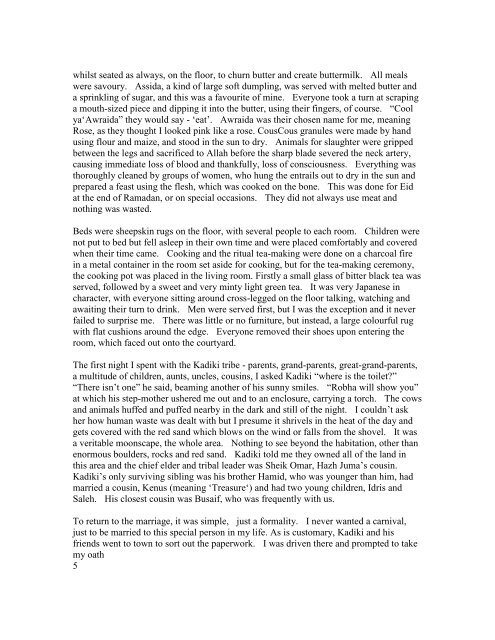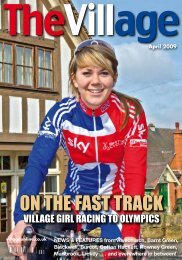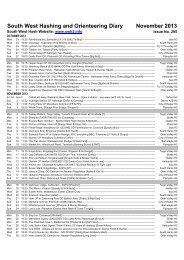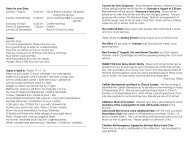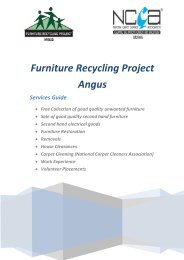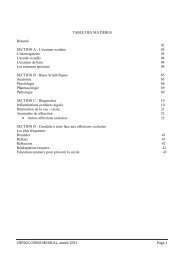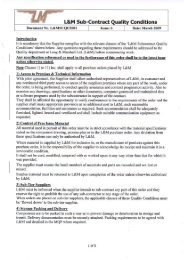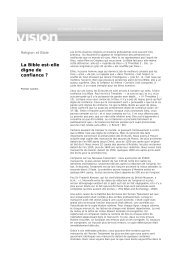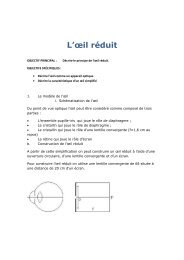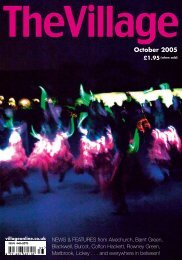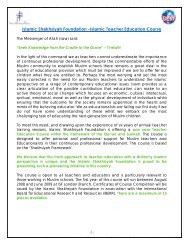The Tribal Wife
The Tribal Wife
The Tribal Wife
You also want an ePaper? Increase the reach of your titles
YUMPU automatically turns print PDFs into web optimized ePapers that Google loves.
whilst seated as always, on the floor, to churn butter and create buttermilk. All meals<br />
were savoury. Assida, a kind of large soft dumpling, was served with melted butter and<br />
a sprinkling of sugar, and this was a favourite of mine. Everyone took a turn at scraping<br />
a mouth-sized piece and dipping it into the butter, using their fingers, of course. “Cool<br />
ya‘Awraida” they would say - ‘eat’. Awraida was their chosen name for me, meaning<br />
Rose, as they thought I looked pink like a rose. CousCous granules were made by hand<br />
using flour and maize, and stood in the sun to dry. Animals for slaughter were gripped<br />
between the legs and sacrificed to Allah before the sharp blade severed the neck artery,<br />
causing immediate loss of blood and thankfully, loss of consciousness. Everything was<br />
thoroughly cleaned by groups of women, who hung the entrails out to dry in the sun and<br />
prepared a feast using the flesh, which was cooked on the bone. This was done for Eid<br />
at the end of Ramadan, or on special occasions. <strong>The</strong>y did not always use meat and<br />
nothing was wasted.<br />
Beds were sheepskin rugs on the floor, with several people to each room. Children were<br />
not put to bed but fell asleep in their own time and were placed comfortably and covered<br />
when their time came. Cooking and the ritual tea-making were done on a charcoal fire<br />
in a metal container in the room set aside for cooking, but for the tea-making ceremony,<br />
the cooking pot was placed in the living room. Firstly a small glass of bitter black tea was<br />
served, followed by a sweet and very minty light green tea. It was very Japanese in<br />
character, with everyone sitting around cross-legged on the floor talking, watching and<br />
awaiting their turn to drink. Men were served first, but I was the exception and it never<br />
failed to surprise me. <strong>The</strong>re was little or no furniture, but instead, a large colourful rug<br />
with flat cushions around the edge. Everyone removed their shoes upon entering the<br />
room, which faced out onto the courtyard.<br />
<strong>The</strong> first night I spent with the Kadiki tribe - parents, grand-parents, great-grand-parents,<br />
a multitude of children, aunts, uncles, cousins, I asked Kadiki “where is the toilet?”<br />
“<strong>The</strong>re isn’t one” he said, beaming another of his sunny smiles. “Robha will show you”<br />
at which his step-mother ushered me out and to an enclosure, carrying a torch. <strong>The</strong> cows<br />
and animals huffed and puffed nearby in the dark and still of the night. I couldn’t ask<br />
her how human waste was dealt with but I presume it shrivels in the heat of the day and<br />
gets covered with the red sand which blows on the wind or falls from the shovel. It was<br />
a veritable moonscape, the whole area. Nothing to see beyond the habitation, other than<br />
enormous boulders, rocks and red sand. Kadiki told me they owned all of the land in<br />
this area and the chief elder and tribal leader was Sheik Omar, Hazh Juma’s cousin.<br />
Kadiki’s only surviving sibling was his brother Hamid, who was younger than him, had<br />
married a cousin, Kenus (meaning ‘Treasure‘) and had two young children, Idris and<br />
Saleh. His closest cousin was Busaif, who was frequently with us.<br />
To return to the marriage, it was simple, just a formality. I never wanted a carnival,<br />
just to be married to this special person in my life. As is customary, Kadiki and his<br />
friends went to town to sort out the paperwork. I was driven there and prompted to take<br />
my oath<br />
5


